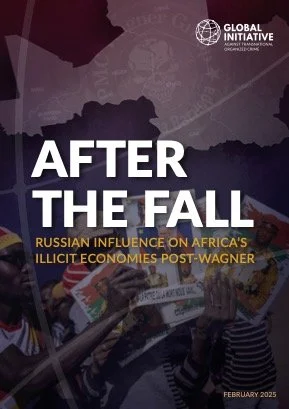By The Global Initiative Against Transnational Organized Crime
Russia’s engagement in Africa has evolved in the aftermath of Yevgeny Prigozhin’s aborted march on Moscow in June 2023 and his death in an aeroplane crash two months later. His private military company (PMC), the Wagner Group, had built up operations in several African countries over the preceding decade by providing mercenary troops, conducting political influence campaigns and by establishing a network of companies in the extractives sector. Would these arrangements survive the death of Wagner’s influential leader? If so, what shape would they take? Moscow acted quickly after Prigozhin’s death by sending high-level officials to several countries to reassure Wagner’s former clients that support would continue uninterrupted. But it was clear that Russia also had larger plans, and was seeking to expand its presence in new arenas. A clear picture is now emerging as to how Russia’s strategy in Africa is developing. It consists of four thematic (and at times overlapping) strands, namely rebranding, maintenance, expansion and diversification. Rebranding Wagner was a priority for the Russian state, as part of its efforts to assert control over an entity that had embarked on a march against the seat of power. Various pathways were created to assimilate Wagner personnel, but the establishment of the Africa Corps, under the direct supervision of Russia’s military intelligence service (GRU), was the most pertinent to Wagner’s Africa operations. Other aspects of Wagner’s operations have also continued under new titles. For example, the African Initiative in Burkina Faso, which disseminates pro-Russian messaging in the region, is in many ways another iteration of Wagner’s media and political influence work, and includes several former Wagner or Wagner-linked staff. The Africa Corps has benefited from direct state assistance – ships delivering tonnes of material for this outfit have been recorded arriving in Libya, for example. However, it has not been an entirely painless transition. The Africa Corps has struggled to generate momentum, with recruitment targets being revised downwards and personnel transferred to Russia. This difficulty may in part explain the somewhat contradictory second theme: that of maintaining the Wagner brand. Maintenance of Wagner as an entity – at least in name – has been a key consideration in Mali and the Central African Republic (CAR), where the brand is strong due to entrenched involvement in economic activities and security services, as well as Wagner’s high public profile. This reflects Moscow’s pragmatism regarding the requirements of local contexts, plus recognition that Wagner’s original interventions were coherent with Russian state interests, and thus did not need to be radically overhauled. ‘Wagner’ Telegram channels also continue to post recruitment advertisements for personnel to work in Africa, highlighting the ongoing power of the brand. However, this continuity may also mask how much has changed behind the scenes: while Wagner ‘lives’ in the CAR and Mali, it is now much more tightly under Moscow’s control. At the same time, the policy space has not been static, and new opportunities for intervention emerged for Russia in 2023–2024. This has led to expansion into several countries in West Africa – Burkina Faso, Chad and Niger – where governments have sought to explore economic and security alternatives to their long-standing Western partners, particularly France. Global Initiative Against Transnational Organized Crime (GI-TOC) research has also highlighted the Republic of Congo, the Democratic Republic of Congo and Senegal as potential future areas of Africa Corps intervention. In part, this more expansionist approach speaks to the step change in the visibility of Russian policy from the early Wagner days, when deniability was a key consideration. (Before Russia’s full-scale invasion of Ukraine, Wagner’s existence was always denied, both by Moscow and Prigozhin.) Russia has long explored state level partnerships with African countries, but now there is greater confidence in and visibility of Russian intentions on the continent, even if the partners on the ground have not changed dramatically from Prigozhin’s stewardship. As a result, what was, under Wagner, a patchwork of local engagements is being knitted together in an overt and more coherent geopolitical vision. Coming out of the shadows allows Russia to cast itself as a backer of African attempts to escape Western neo-colonialism. This is achieved in part by highlighting the West’s failed attempts to tackle Islamist extremism in Africa (and its attempts to super-impose Western values that are sometimes at odds with local culture). Only in Sudan has there been something of a recalibration from Prigozhin’s approach. Prigozhin had partnered closely with the paramilitary Rapid Support Forces (RSF), while the Russian government maintained ties with the government and the Sudanese Armed Forces (SAF), driven by a long-term goal of acquiring a naval base on the Red Sea. This contradiction became sharper when war broke out between Sudan’s military and the RSF in April 2023. Sudan’s emergence as a proxy battleground in the Russia-Ukraine conflict may also have shifted Moscow’s thinking and explain the pivot away from the RSF to more closely align with the SAF, which has sought Russian materiel to fight its paramilitary enemy
Geneva, SWIT: The Global Initiative Against Transnational Organized Crime , 2025. 50p


